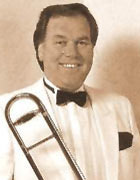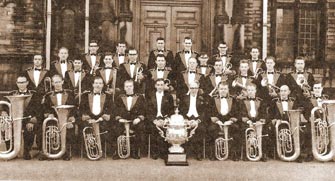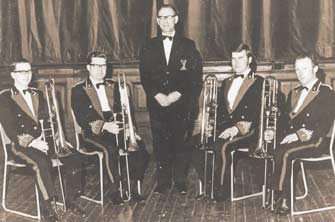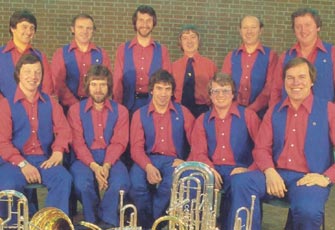|
Thanks for the Memory No 5:
DEREK SOUTHCOTT - A musician with many sounds…
by Chris Helme
 I
suppose the first time I came across the name of Derek Southcott
was on the eve of the British Open Championships at Belle Vue in
1968 when the test piece for that year was Gilbert Vinter’s
‘John O’Gaunt’ and Derek was playing 2nd Trombone
with the Black Dyke Mills Band. Although there were only a handful
of us at the traditional pre-contest public rehearsal Black Dyke
held in the village those of us who were there knew this test piece
was different. Derek recalls that when ever it was music by Gilbert
Vinter they knew to expect something both challenging and different. I
suppose the first time I came across the name of Derek Southcott
was on the eve of the British Open Championships at Belle Vue in
1968 when the test piece for that year was Gilbert Vinter’s
‘John O’Gaunt’ and Derek was playing 2nd Trombone
with the Black Dyke Mills Band. Although there were only a handful
of us at the traditional pre-contest public rehearsal Black Dyke
held in the village those of us who were there knew this test piece
was different. Derek recalls that when ever it was music by Gilbert
Vinter they knew to expect something both challenging and different.
The trombone section in those days was Frank Berry; Derek and Ian
Copland on Bass – for those readers not familiar with the
piece or had forgotten it - at one point it calls for ‘Bell-up’
on all three trombone parts. At the rehearsal all did exactly that
– mind you this was a closely guarded secret - Geoffrey Brand
their Professional Conductor and someone who was to conduct them
to many successes during what can only be described as a purple
patch in the band’s post-war history – he wanted the
trombone section to actually stand up at the contest and face the
adjudicator’s box when it came to play the ‘Bell-up’
section. At what was a packed Kings Hall that day with an atmosphere
that can only be described as sheer electric Black Dyke took to
the stage playing off number 10 and with Geoffrey Brand at the helm
in what was his first contest outing with the band everyone anticipated
a memorable performance.
The rest as they say is history – they were the only trombone
section to stand up that day and the band took the coveted first
prize with 194 points (Wingates were drawn 15 and came 2nd with
193 points and Grimethorpe were placed 3rd playing off number 2
with 192 points). It’s a piece you don’t seem to hear
that often these days and to remind myself of that memorable day
at Belle Vue I have just listened to it on my crackly copy of the
Black Dyke 1969 LP record ‘Champions Again’ on the Pye
Records label number GSGL 0427 and even now it still makes the hair
stand up on the bank of your neck.
Geoffrey Brand has fond memories of those distant days as well
and recalls…
“…It was quite remarkable that in the early years
of my time with Black Dyke Mills Derek showed a real performing
talent which has subsequently blossomed.
Now, to that John O'Gaunt episode - your memory is right - during
the preparation of John O'Gaunt I became increasingly aware that
the bold statement of the John O'Gaunt motif at bar 306 - scored
for trombones only and marked - Bell up - really had to be commanding
and dramatic.
The whole band is marked fortissimo - Eroico e molto maestoso -
and I felt that even Black Dyke's marvellously forthright trombones
were not able to produce sufficient volume to really command the
scene as the composer had intended.
At the Thursday evening rehearsal, in the Victoria Hall, I decided
that to stand up was needed - and having tried it and heard it I
knew it worked- so stand up they did.
The important point is that the gesture was entirely musically based
- was it a secret?, no not really, since the audience at Victoria
Hall saw and heard it all; but I thought it un-necessary to announce
it to the world before the actual performance. On the platform at
Belle Vue it worked splendidly - and since Black Dyke Mills Band
were winners on the day the means justified the end …”
But let us go back a few years and look back how Derek Southcott
made his journey through the brass band world before stepping out
on to that famous stage at the Kings Hall in 1968.
He was born in 1946 in Hitchin, Hertfordshire his dad Ted was a
cockney and his mother Jessie was born in Halifax. In the early
post-war years ex-servicemen had to look for work – shortly
after Derek’s third birthday the family moved north and his
mother worked for Crossley’s Carpet Mill at Dean Clough in
Halifax and his dad was employed as an Auto-electrician at Hoffman’s
a well respect garage which was also in Halifax.
It was during the mill holidays that the Southcott family went
to the seaside and at Christmas time went to the annual pantomime.
It was when Derek was about ten years old and on one of these family
outings that he came across the name of Eddie Calvert and heard
him playing his golden trumpet – well Derek made his mind
up there and then ‘…that’s what I want to do…’
Derek was introduced to the world of brass bands through Louis
Swingler (the ex-Black Dyke horn player c: 1930) who worked at Dean
Clough carpet mill and someone who was actively involved with the
Crossley Carpets Junior Band. Although the golden trumpet never
materialised – his first instrument was the Baritone –
but the nearest he did come to playing the trumpet came when he
moved onto the cornet.
A neighbour in those days was George Ferneyhough who was the 2nd
trombone player and was for a while the Eb Bass player for the Crossley’s
Senior Band and whilst having his lessons it was George who suggested
that he should move on to the trombone. Well, to say Derek was made
up was an understatement - he was soon telling everyone even the
Vicar at his local church and that he was now going to be in his
church pantomimes and concerts – such confidence for a 12
year old.
However, it wasn’t long that the initial interest began to
fade after realising that it was not going to be as easy as he first
thought. From his own initial enthusiasm it was now his mother who
both encouraged him and refused to let him simply throw the towel
in and give up.
Through his own dogged perseverance and of course the driving force
of his mother he did stick with it and gradually he did begin to
improve – he moved from the Crossley Carpets Junior Band to
play with the Friendly Band which was and still is based on the
outskirts of Halifax. He next teacher was John Harrison who was
the musical director of the Crossley Carpets Senior Band and a highly
respected name in the brass band world – this was a band he
took almost to the very top of the tree when they came second at
the Nationals to that truly memorable performance by the CWS (Manchester)
Band in 1962 when the test piece was Force of Destiny.
By now Derek was still only 14 and becoming a regular winner on
the slow melody circuits and beginning to get himself known in all
the right places. Obviously aware of all these successes George
Ferneyhough called to see him and asked if he was interested in
the 2nd trombone position at Crossley Carpet Senior Band.
By now Derek was receiving tuition from Ronnie Fawthrop the ex-2nd
Trombone player at Black Dyke and would regularly have lessons at
Ronnie’s home. It was on one of these occasions that he met
Grenville Richmond who was the Solo Trombone player with Black Dyke
as well as a good friend of Ronnie and his former tutor. It was
not long after that he was invited to audition for the vacant 2nd
Trombone position at Black Dyke – in 1961 at the age of sixteen
he was appointed and just one position below his now new tutor and
principal trombone player Grenville Richmond.
Derek’s standard of playing was now coming on in leaps and
bounds and when Grenville decided to leave Black Dyke in 1964 he
felt that Derek might have had an opportunity to audition for the
vacant Principal Trombone position. Sadly that was not to be and
in late 1964 Huddersfield born Frank Berry was appointed to the
position and remained on the top chair for the next 17 years and
then stayed a further 3 years on 2nd Trombone.

Black Dyke Mills Band – 1962
Back Row (left to right):
Jeffrey Bairstow (Cornet); Jack Brooke (Cornet); Leonard Haley (Percussion);
Tommy Waterman (Soprano) Eric Bland (Cornet & Librarian); John
Clay (Flugel); Les Hanman (Cornet)
Middle Row:
David Summersgill (Trombone); Grenville Richmond (Trombone); Derek
Southcott (Trombone); William Gibson (Cornet); Maurice Murphy (Cornet);
David Platt (Cornet); Peter Hey (Cornet); Sam Smith (Horn);
Malcolm Blowers (Horn);
Front Row:
Peter McNab (Bb Bass); Charles Emmott (Eb Bass); Geoffrey Whitham
(Euphonium); John Slinger (Baritone); Jack Emmott (Conductor); Leighton
Lucas (Professional Conductor); John Clough (Baritone); Brian Broadbent
(Euphonium); Ernest Keeton (Eb Bass); Harry Pickering (Bb Bass)
It was Christmas 1969 when perhaps destiny or was it luck that
an unfortunate accident was going to change his life and future
musical direction. Whilst leaving home he slipped on a patch of
ice which resulted in his leg being in a full length plaster cast
for several weeks. Naturally he was unable to sit on the band coach
and travel to engagements and then perform with the rest of the
band on stage with his leg in that condition – mobility was
practically impossible.
So it was whilst on this enforced break from Black Dyke that he
was approached and offered the opportunity of playing in a pit orchestra
for an amateur show in Huddersfield.
It was here that he met the trumpet player Brian Tann a player
who had been around the show scene for a number of years and someone
who introduced Derek to the Batley Variety Club ‘Blow Band’
which was the ‘Stuart Atkins Orchestra the club’s regular
orchestra where he was asked to join on trombone – little
did he know at that time he was now on the fringe of a new musical
career and taking the first steps along a road to eventually becoming
a professional musician.
For Derek this style of music brought back memories of an uncle
who himself played a drums and had a cherished number of crackly
old 78 rpm records featuring the Glenn Miller Orchestra which Derek
played incessantly on his old wind-up gramophone player. Derek remembers
those visits to his uncle’s home and remembers playing them
on almost every visit – his uncle is very proud to see his
young nephew playing lead trombone in later years with such as the
Syd Lawrence Orchestra and at the BBC.
At Batley Variety Club he came into contact with many professional
musicians – one of those was Stuart Atkins, trombone player
in the club’s small band and someone who Derek was to ultimately
‘dep’ for on occasions. It was also through his contact
and help from Stuart that he became a member of the club’s
‘amalgamated band’ – this band was formed on those
occasions when the big stars of the day were performing at the club
such as Johnny Mathis, Shirley Bassey, Jack Jones, the Three Degrees
and Cliff Richard but to name a few.
In 1964 he became the Champion Trombone of Great Britain and was
also a member of the Champion quartet.

Black Dyke Trombone Quartet – 1964
From left to right:
Ian Copland, Colin Hardy who was also the band’s second baritone
player as well, Peter McNab (conductor), Derek Southcott and Frank
Berry
It was now 1972 and Derek’s work commitments were becoming
congested - he was still a member of Black Dyke, playing with local
pit orchestras, playing at Batley Variety Club and still holding
down his day time job as an Engineering Draughtsman – a busy
young man to say the least – something had to give. By this
time he had made his mind up to become a professional musician a
decision that prompted him to resign from Black Dyke after nine
years, an experience and time which he still appreciates were musically
very profitable.
He was now embarking on the road of the professional musician and
was actively looking to build up the amount of freelance work he
was beginning to be offered.
In 1972 he and Jim Shepherd had been discussing the possibility
of forming a small group similar to that of the Black Dyke Octet.
The group would not simply play brass band music but it would expand
its repertoire to cover a wider range of music - the idea was talked
about but neither took the giant leap to get it on the road. Eventually
with Derek still a draughtsman by day and freelancing at night it
was he who had a meeting with Jim to ask him is it yes or no –
the answer was yes and then came the discussion about who was to
be asked to join them.
Those who did come together to make up the original James Shepherd
Versatile Brass included: Jim Shepherd – Cornet & Trumpet;
David Horsfield - Flugel Horn/Cornet/Trumpet; Peter Ferris –
Trumpet; Brian Wood – Horn; David Moore – Euphonium;
Derek Southcott – Trombone; Donald Bowes - Bass Trombone;
Colin Aspinall – Tuba; Harvey Whiteley – Percussion.

James Shepherd Versatile Brass - 1979
Left to right (Back row):
Angelo Bearpark; James Shepherd; J. Graham Walker; Michael J. Hopkinson
(Business Manager); David Horsfield; Gordon Higginbottom
(Front Row):
Alan Widdop; Kevin Edwards; Colin Aspinall; David Moore;
Derek Southcott
Once the team had been put together they rehearsed on Sunday’s
at the Outwood Memorial Hall on the outskirts of Wakefield. Jim
Shepherd remembers those early days well and recalls that it was
Derek Southcott who suggested they should have a conductor –
not that they needed one but it felt right - shortly after the first
rehearsal Dennis Wilby was invited to join them as their first musical
director.
Shortly after the group’s first successful concert which
they held at the Uppermill Civic Hall Derek was then offered a full
time position at the Wakefield Theatre Club so after being with
the JSVB from its inception he now had to leave – his position
was taken by John Pollard from Grimethorpe.
It was whilst playing at the Wakefield Theatre Club that he met
Ernie Watson who was the lead trumpet at the BBC Northern Dance
Orchestra. Derek is certain that meeting Ernie changed his musical
direction and put him on a path that today he will always be grateful
for. It was Ernie who gave Derek a gentle nudge and said ‘…go
for it…’ A vacancy came up at the BBC for principal
trombone at the Northern Dance Orchestra – it turned out that
Derek was one of 53 applicants for the job but his audition proved
successful enough for him to be offered the post. Not long after
Derek’s appointment the orchestra then became the BBC Northern
Radio Orchestra and following this appointment he now became a full
time musician by leaving his job as an Engineering Draughtsman.
His appointment came just at the right time - the world of live
entertainment was changing during the 1970’s and the paying
public were moving onto other forms of entertainment. These changes
affected Wakefield Theatre Club just as they did to many others
by forcing them to close down or re-brand themselves.
It was whilst playing with the BBC Northern Radio Orchestra that
he received the call from Jim Shepherd asking if he would help them
out with a series of concerts with JSVB in Australia - after the
trip Derek stayed on with JSVB for a while and also played with
the BBC Northern Radio Orchestra.
There were changes taking place at the BBC as well – changes
which would affect members of the various orchestras including Derek.
However, his growing reputation saw him now being asked to ‘dep’
on occasions with the famous Syd Lawrence Orchestra on lead trombone.
This situation worked out well for Derek because Syd Lawrence believed
that the paying public only wanted to socialise on Friday, Saturday
and Sunday nights and therefore he rarely if ever took any engagements
during the week thus enabling Derek to maintain his now decreasing
BBC commitments and his new work with Syd Lawrence.
During his professional career Derek has made over 5000 recording
sessions with television, radio, records and CD’s. In 1993
he released his own CD which is still available through Kirklees
Music Publishers (01484 – 722855). This CD he aptly titled
‘Facets – the many sounds of Derek Southcott’.
He is accompanied by the Stocksbridge Band and his own Derek Southcott
Sextet and covers a full range of his musical skills and styles.
It was whilst helping out with the orchestra that Syd Lawrence asked
Derek if he wanted to join on a full time basis, an opportunity
he was to grasp with both hands –Derek retired from the orchestra
in August of this year after 22 years and is proud to say that during
his long stay he and the now late Syd Lawrence had been personal
friends for many years – and agreed that Syd was proved right
time after time about the socialising habits of the public.
Derek also visited Switzerland and Norway which opened another
doorway for him – teaching. After that first visit to Norway
some 22 years ago he was invited to become a tutor with the Manger
Folk School for one week on an annual basis.
He was then offered a teaching post at the Strensall Army base with
the Army’s King Division and was made an honorary Professor
of Brass Instrumental Teaching – three years as a trombone
tutor. His stay with the Kings Division was an enjoyable experience
but by this time following further changes at the BBC his sessional
work engagements were becoming more infrequent - with this in mind
Derek decided it was time to extend his teaching a role which he
first experienced back in the days as a draughtsman when he was
also employed at Halifax Education Music Centre on a Saturday mornings
and for Adult Education Classes on Wednesday’s.
This led him into accepting teaching posts at the Leeds College
of Music for three years; Barnsley College of Music and as a consultant
for Yamaha musical instrument manufacturers where he visited as
many as two hundred schools lecturing and teaching the skills of
playing a musical instrument. These days his teaching portfolio
has slimmed down to just seven different schools in the North of
England. His work not only includes teaching his students about
the world of music but also about orchestras and in particular the
style of music he has been involved in over the last 30 years in
both brass and orchestral. He runs five schools bands, dance orchestras
and wind bands as well a brass ensemble and his own professional
sextet.
This year he formed the Caldervalley Youth Dance Orchestra, ‘…CYDO…’
- a name he chose as a tribute to his old friend Syd Lawrence, which
attracts members from a wide catchment area.
After 22 years with the Syd Lawrence Orchestra he is now as busy
as ever with his teaching, examining, freelance playing and now
public speaking. Having been on the local speaker circuits myself
for a number of years inevitably you get to know who else is on
the circuit. ‘Mr Trombone Man’ as Derek is billed at
his presentations with Probus Clubs and similar small local groups
is now beginning to be in demand. With the benefit of a small sound
system he can take his trombone with him and demonstrate his skill
and exceptional talent in aspects of his presentation.
Over his many years as a brass player he has had many happy and
memorable moments. In the early days with JSVB for example he knew
from that first rehearsal they had something special to offer. Derek
recalls one of the most amusing performances he remembers was when
he was with JSVB for the second time and was on stage ready to play.
It was a solo spot with Gordon Higginbottom the legendary Horn player
who was to perform an arrangement of ‘The Flight of the Bumble
Bee’ –
Derek knew it would be played to Gordon’s usual high standard
but what he did not know until Gordon walked on stage was that he
would perform the solo dressed in a full body yellow and black stripped
bumble bee outfit. Even Gordon still managed to keep his familiar
dour face straight, not even a smirk or hint of him laughing –
and of course went on to play the solo brilliantly. Whilst the group
members remained the consummate professionals at all times however,
on that occasion Derek recalls how even they almost most collapsed
with laughter when he first appeared on stage.
Well there we are, it has been a long journey for Derek from those
early days of playing at his local church and then striding out
onto that famous stage at the Kings Hall and finally becoming a
well respected professional musician. It has been a journey that
has also brought him a lot of pleasure and the opportunity of meeting
some of the people that only we mere mortals have dreamt about.
He now has the pleasure of teaching young people who are taking
their own early steps on that same long journey as he did all those
years ago.
and finally …..We have all read about such and such a player
who became the Solo Champion of Great Britain in a particular year
and another player who won it in another year – but has anyone
ever seen a full list of all the winners from the early days in
Oxford – if you have I would be interested to hear from you.
and ….The late Arthur Laycock was one of the finest cornet
players who sadly died in 1929 aged only 42 – His death was
shortly after having played at two concerts as guest soloist for
the St Austell Band. Arthur was married but never had any children
and was interred in Earby Cemetery near Colne – his brother
Harold Laycock was a fine trombone player he was married and did
have a daughter who I believed lived in the Nottinghamshire area.
I am trying to trace any family of Harold Laycock – can any
reader help. I can be contacted on email address chrishelme@brighouse.fsnet.co.uk
Happy New Year
Previous 'Thanks for the Memory' articles:
• No. 4: Rowland Jones - more...
• No. 3: Louis Allison - more...
• No. 2: Willie Barr - more...
• No. 1: Derek Garside - more...
© Chris Helme 2003
© 4BarsRest
 back
to top back
to top
| 
